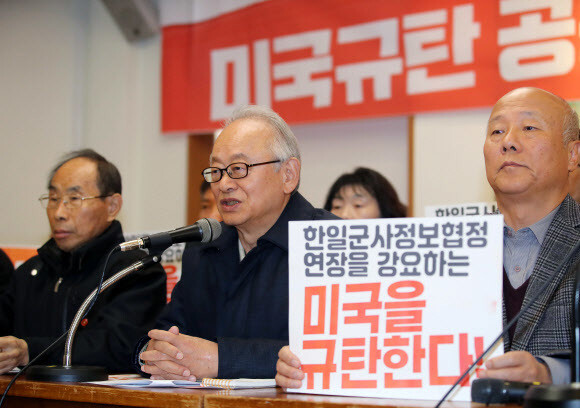hankyoreh
Links to other country sites 다른 나라 사이트 링크
S. Korea, Japan foreign ministry officials meet in Tokyo to discuss GSOMIA and forced labor issue

With South Korea and Japan’s General Security of Military Information Agreement (GSOMIA) on the verge of being terminated at midnight on Nov. 23, the South Korean government continues to try to resolve its dispute with Japan. Government officials sat down with forced labor victims to hear their opinions, and bureau chiefs from the two countries’ foreign ministries held a meeting.
South Korea’s Ministry of Foreign Affairs (MOFA) announced on Nov. 14 that Kim Jung-han, MOFA’s director-general for Asian and Pacific Affairs, would be meeting with Shigeki Takizaki, director-general of Asian and Oceanian affairs at Japan’s Ministry of Foreign Affairs, in Tokyo on Nov. 15 to discuss matters of mutual interest. The two officials are expected to discuss the South Korean Supreme Court’s ruling that awarded compensation to victims of forced labor, Japan’s tightening of export controls on South Korea, and South Korea’s decision to terminate GSOMIA.
Considering that South Korean Prime Minister Lee Nak-yeon and South Korean President Moon Jae-in both failed to reach an understanding with Japanese Prime Minister Shinzo Abe during meetings held on Oct. 24 and Nov. 4, Kim and Takizaki’s meeting is unlikely to lead to an agreement.
“Our two countries hold these deliberations regularly each month to maintain dialogue. The fundamental differences in our positions present some difficulties,” said MOFA official.
The Hankyoreh has also learned that the South Korean government recently met with forced labor victims to hear their opinions about how they would like the issue to be resolved going forward. These meetings were attended by members of a task force that was set up after the Supreme Court reached its ruling in October 2018. The task force, which reports to the Office of the Prime Minister, is composed of officials from MOFA, the Ministry of Justice, and the Ministry of the Interior and Safety.
Victims want solution that holds Japan directly responsible“We emphasized once again to the government that the victims are unlikely to accept a plan that doesn’t involve the Japanese government taking direct responsibility,” said a representative for the victims of forced labor.
“Our position is that the solution to the issue of forced labor should focus on the victims. We have listened to the stories of the victims, who are the most important part of the process of canvassing opinions from various groups and sectors,” a government task force official said.
By Kim So-youn, staff reporter
Please direct comments or questions to [english@hani.co.kr]

Editorial・opinion
![[Correspondent’s column] The real reason the US is worried about Chinese ‘overcapacity’ [Correspondent’s column] The real reason the US is worried about Chinese ‘overcapacity’](https://flexible.img.hani.co.kr/flexible/normal/500/300/imgdb/original/2024/0510/5217153290112576.jpg) [Correspondent’s column] The real reason the US is worried about Chinese ‘overcapacity’
[Correspondent’s column] The real reason the US is worried about Chinese ‘overcapacity’![[Editorial] Yoon’s gesture at communication only highlights his reluctance to change [Editorial] Yoon’s gesture at communication only highlights his reluctance to change](https://flexible.img.hani.co.kr/flexible/normal/500/300/imgdb/original/2024/0510/7717153284590168.jpg) [Editorial] Yoon’s gesture at communication only highlights his reluctance to change
[Editorial] Yoon’s gesture at communication only highlights his reluctance to change- [Editorial] Perilous stakes of Trump’s rhetoric around US troop pullout from Korea
- [Guest essay] Preventing Korean Peninsula from becoming front line of new cold war
- [Column] The state is back — but is it in business?
- [Column] Life on our Trisolaris
- [Editorial] Penalties for airing allegations against Korea’s first lady endanger free press
- [Editorial] Yoon must halt procurement of SM-3 interceptor missiles
- [Guest essay] Maybe Korea’s rapid population decline is an opportunity, not a crisis
- [Column] Can Yoon steer diplomacy with Russia, China back on track?
Most viewed articles
- 1[Correspondent’s column] The real reason the US is worried about Chinese ‘overcapacity’
- 2S. Korea “monitoring developments” after report of secret Chinese police station in Seoul
- 3Nuclear South Korea? The hidden implication of hints at US troop withdrawal
- 4[Editorial] Yoon’s gesture at communication only highlights his reluctance to change
- 5Yoon voices ‘trust’ in Japanese counterpart, says alliance with US won’t change
- 6No good, very bad game for Korea puts it out of Olympics for first time since 1988
- 7Presidential office warns of veto in response to opposition passing special counsel probe act
- 8Smartphones have been shown to hurt brain development — can Korean kids kick the habit?
- 9‘We must say no’: Seoul defense chief on Korean, USFK involvement in hypothetical Taiwan crisis
- 10Korea poised to overtake Taiwan as world’s No. 2 chip producer by 2032